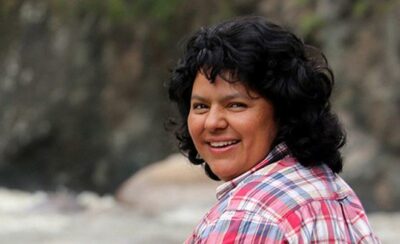
At the Civic Council of Popular and Indigenous Organizations of Honduras (COPINH), the organization that Berta Cáceres founded, they have a saying “Berta did not die: she multiplied”; that March 2nd was not the date of Berta’s death, but her sowing, her return to the land that she defended when she was still breathing, before her murderers took her life.
In a certain sense, it has never been more accurate to speak of “sowing” a life than in death of Berta Caceres. The COPINH has survived and grown, despite the onslaught of the corrupt and repressive government of Juan Orlando Hernández, which has the support of the U.S. Embassy. The web of organizations, groups, media and individuals standing in solidarity with the COPINH across the globe is stronger and denser. Since her death, many books, articles, songs and poems have been written about Berta and her struggle, although none as eloquent and clear as the words she also left behind.
To commemorate the anniversary, I spoke with two of her daughters, Laura and Bertha Zúñiga Cáceres, who have become leaders of COPINH and references in indigenous, feminist, political and social resistance in Honduras.
Laura Zúñiga explains: “The image of my mom has inspired us in different ways, I believe that one of the ways in which she has inspired us is the leadership of women: how we can take on the struggles, how we can lead these processes that involve rebelling against these companies, but also involve learning to dream together, learning to break with the patriarchy and machismo that has tried to remove us from public life, from political life. We have managed to keep the Gualcarque River flowing, we have managed to point out those guilty of the murder of my mother, but there are still many challenges.”
“Women throughout history, especially in the history of our indigenous peoples, have been the ones who have kept the memories of resistance. We have learned to weave, conspiring against the violence of patriarchy, against the powers that have tried to erase our identity. We have been the women also who have challenged even traditional ways of thinking, because we continue to question oppression and power deep down – in families, in our inner selves, in our partners. And I think it is rethinking life, rethinking dignity, from what is more external to what we have internalized is very important. Besides, we are the women who are fighting back, let’s say, in the most adverse moments and we have seen this with the leadership of my mom, but also with a lot of women’s leadership within the communities in Honduras”.
She points out that the concession for the hydroelectric “death project” is still in the hands of the Central American Bank for Economic Integration, that the DESA company has not suffered serious repercussions despite its direct participation in the crime, that the intellectual authors of Berta’s murder have not been tried, that attacks against land and territory defenders continue, and the promotion of the extractivist model continues unabated in the country.
Bertha Zúñiga Cáceres is currently the general coordinator of COPINH. She talks about the death of her mother: “For the Lenca people, of course it was a very strong moment of rupture, but that is why we say that Berta has multiplied, because the communities continue in this process – with their obstacles and their problems, facing all the challenges on a daily level and in this sense, this whole emancipatory project that Berta Cáceres built continues to materialize.”
Bertha talks about the work achieved by her organization over the past five years: the community radio stations that inform and keep culture alive, the research for the struggle, the denunciation not only of the companies, but also of the financial entities that make possible the projects that violate the human rights of the peoples such as Agua Zarca, and of the state that is in charge of the dispossession. COPINH continues to articulate the opposition to extractivist projects, defending the territory, and also the culture, identity and ancestral wisdom. It has health, education, communication and anti-violence projects.
And how is the search for justice and truth in the case of her mother’s murder going? Bertha says: “This process is going quite slowly and we are facing the main wall which is the unwillingness of the Honduran state to prosecute and punish those responsible, the decision-makers, those most responsible for this crime. We have had the possibility to know their names and to know information that normally in emblematic cases and in high impact crimes is not found, however, the state of Honduras has done everything possible not to clarify the crime because there is a pact of impunity, a pact of corruption, because this family, Atala Zablah, is part of the power group that has a special impunity and has made a pact with this government.”
Laura answers what keeps her in the struggle: “For me the most important thing is to rebel in the face of death, it is rebellion. It is not accepting that violence has to demobilize or fear will take us away from the conviction that justice is necessary for this country. The other thing is the love for our mother, the tremendous indignation, the tremendous pain that this case gave us, and the need for non-repetition, which in this country is difficult. That is what moves us: to dismantle this system of death that we live today in the country.”
COPINH activities continue this week, which is also the birthday of Berta Cáceres, two days after the anniversary of her death (more information can be found on the page: https://copinh.org/). Her organization, her thoughts, her words, her daughters and her convictions are seeds that bear fruit in a hostile climate.



